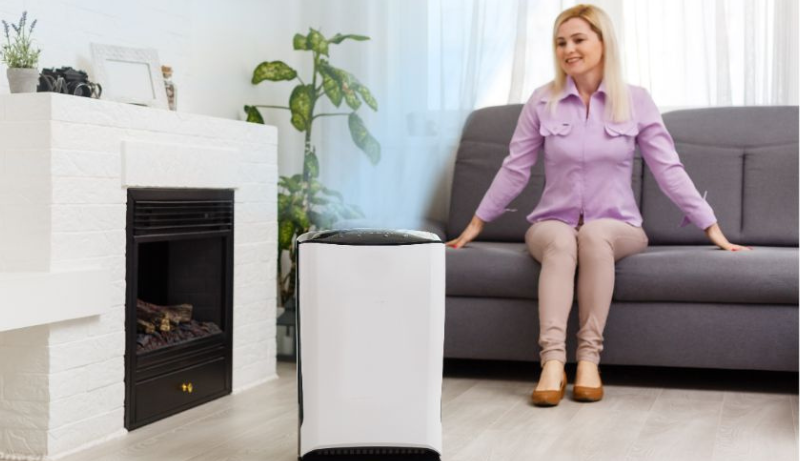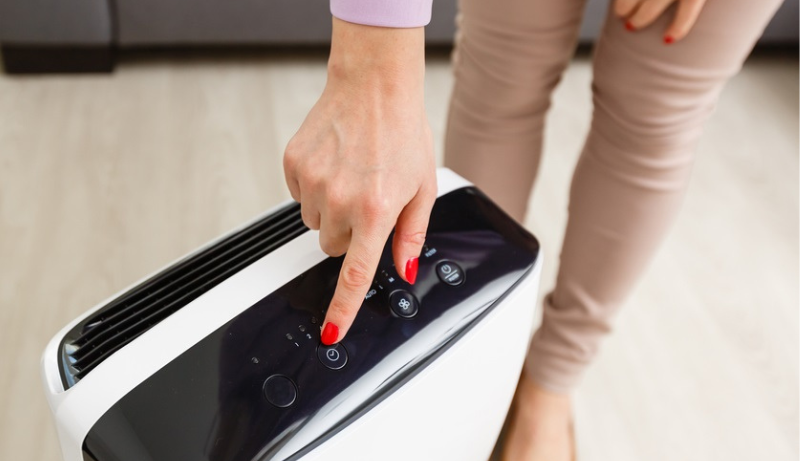As concerns regarding indoor air quality continue to grow, an increasing number of individuals are turning to air purifiers as a solution to enhance the quality of the air they breathe indoors.
However, a common inquiry among users is: “How long should I keep my air purifier running?”
In this comprehensive guide, we will explore the various factors that influence the recommended duration for using an air purifier, the advantages it offers, and practical tips for maximizing its efficiency.
Understanding Air Purifiers
- What Is an Air Purifier?An air purifier is an electronic device engineered to enhance indoor air quality by eliminating harmful pollutants such as dust, pollen, pet dander, smoke, and airborne bacteria. It operates by drawing in air, passing it through various filters, and then releasing purified air back into the room.
- How Does an Air Purifier Work?Air purifiers employ a range of technologies including High-Efficiency Particulate Air (HEPA) filters, activated carbon filters, and UV-C light to capture and neutralize airborne contaminants. These filters are highly effective in trapping particles of different sizes, ensuring cleaner and healthier air.
Benefits of Using an Air Purifier
- Improved Air Quality: One of the primary advantages of using an air purifier is the substantial enhancement in indoor air quality. By eliminating pollutants, allergens, and irritants, it creates a fresher and healthier living environment.
- Allergy and Asthma Relief: For individuals with allergies or asthma, air purifiers can provide much-needed relief. By reducing airborne triggers, such as pollen and mold spores, it minimizes allergy and asthma symptoms, promoting better respiratory health.
- Removing Unpleasant Odors: Air purifiers equipped with activated carbon filters can effectively eliminate unwanted odors, such as cooking smells, tobacco smoke, and pet odors, leaving your home smelling clean and pleasant.
Factors to Consider for Optimal Air Purifier Usage
- Room Size and Air Purifier Capacity: The size of the room plays a crucial role in determining the appropriate duration for operating an air purifier. Larger rooms require air purifiers with higher Clean Air Delivery Rate (CADR) to effectively clean the air.
- Indoor Air Quality: If the indoor air quality is relatively poor due to smoke, excessive dust, or chemical fumes, it is advisable to run the air purifier for longer durations.
- Specific Health Concerns: Individuals with respiratory issues or compromised immune systems may benefit from running the air purifier continuously to maintain a cleaner and safer indoor environment.
General Guidelines for Operating an Air Purifier
- Continuous Operation vs. Intermittent Usage: For general air quality maintenance, it is recommended to run the air purifier continuously. However, during periods of lower pollution levels, intermittent usage can help conserve energy.
- Nighttime Operation: Keeping the air purifier on during sleep can improve sleep quality, especially for individuals sensitive to allergens or noise. Look for models with a “sleep mode” for quieter operation.
- Maintenance and Filter Replacement: Regularly cleaning and replacing air purifier filters are essential to ensure optimal performance. Follow the manufacturer’s guidelines for maintenance to prolong the lifespan of your device.
Maximizing the Efficiency of Your Air Purifier
- Proper Placement: Position the air purifier strategically, away from obstacles, to allow for proper airflow and efficient purification.
- Reducing Indoor Air Pollutants: Implement measures like smoking outdoors, using exhaust fans, and reducing the use of harsh chemicals to minimize indoor air pollutants.
- Regular Cleaning: Clean the exterior of the air purifier and surrounding areas regularly to prevent dust and dirt buildup, which can affect its efficiency.
Understanding Air Purifier Noise Levels
- Decibel Levels and Considerations: Check the decibel levels of your air purifier, especially if you plan to use it in quiet areas like bedrooms or offices.
- Quiet Operation for Better Sleep: Seek air purifiers designed for quiet operation to ensure a peaceful and undisturbed sleep environment.
Tailoring Air Purifier Usage to Different Seasons

- Spring and Summer: During allergy seasons, consider running the air purifier for longer hours to combat increased pollen and allergens.
- Fall and Winter: In colder months when windows are often closed, maintaining good indoor air quality becomes even more critical, making continuous air purifier operation essential.
Tips for Selecting the Right Air Purifier
- Filter Types: Choose an air purifier with HEPA filters, as they are highly effective in capturing allergens and fine particles.
- Energy Efficiency: Opt for an energy-efficient air purifier to minimize electricity consumption, especially if you plan to use it for extended periods.
- Additional Features: Consider air purifiers with additional features like air quality sensors, timers, and remote controls for added convenience.
Frequently Asked Questions
- Can I leave my air purifier on all day? It is safe to leave your air purifier on all day, especially if you have specific air quality concerns or respiratory issues.
- How often should I replace the filters? Filter replacement frequency varies, but a general guideline is to replace them every 6 to 12 months, depending on usage and filter type.
- Can air purifiers help with pet allergies? Yes, air purifiers with HEPA filters can effectively capture pet dander and allergens, providing relief for pet allergy sufferers.
- Do air purifiers consume a lot of energy? Energy consumption varies between models, but many modern air purifiers are designed to be energy-efficient.
- Is there any difference between air purifiers and air filters? While both aim to improve air quality, air purifiers go beyond by actively removing pollutants and allergens from the air.
Conclusion
Investing in an air purifier can significantly enhance the quality of the air you breathe indoors, leading to improved health and well-being. By considering factors such as room size, indoor air quality, and personal health concerns, you can determine the optimal duration for running your air purifier. Be sure to follow maintenance guidelines and select a suitable air purifier that aligns with your specific needs.
